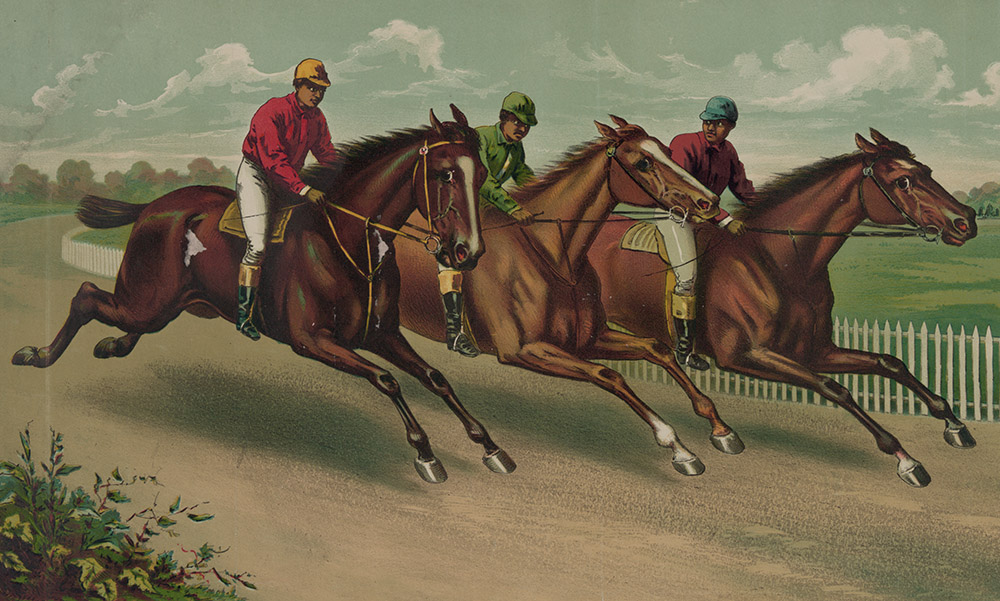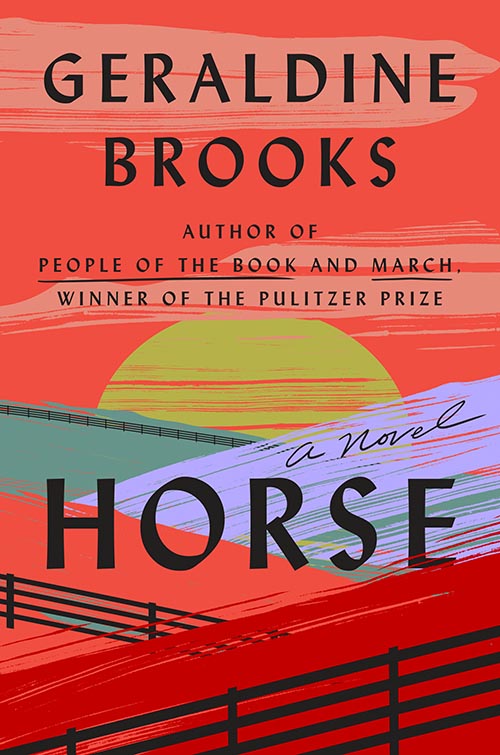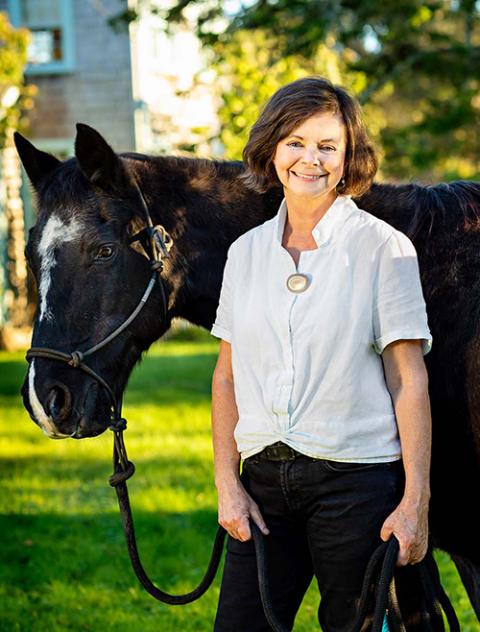
A 19th-century American illustration of horse racing (Library of Congress)

In Horse, author Geraldine Brooks' control of her craft is on full display. Her multiple plots and sets of characters collaborate to achieve a single effect — an effect that is itself unsettling. Readers will come away from the novel wondering at the intransigence of racism in America and, if they are people of faith, uncomfortable with the fact that worship groups have not done a better job of denting the self-interest that helps racism hold sway in the U.S.
The novel weaves three main stories: that of an enslaved person tending to a colt who becomes a phenomenal racehorse; that of a Nigerian American grad student who, having happened upon a lost painting of the horse, makes Lexington the focus of his dissertation; and that of the horse itself.
Two other lives, those of a 19th-century portrait painter and a 20th-century gallery owner, support these central stories, functioning as connective tissue to the horse's portrait. Slavery and its residue — racism — are at the core of the novel.
Even Lexington, thought to be the fastest horse ever, is affected by racism and greed. On the one hand, he is cosseted by his owners and valued for his unparalleled speed and will to win. On the other, as a commodity, he is destined to be literally run to death. A fluke saves him: For a while, a white trainer's vanity refuses to allow a diligent black groom to care for the horse. That leads to Lexington's eventual blindness but also saves him from what would have been his fate.
Brooks immerses readers in 19th-century horse racing. The races of the period featured grueling 4-mile heats — and sometimes more than one. Sports newspapers covering horse races had better circulation than most other newspapers. Winning horses were better known and admired than most public figures. Gambling was rampant. The egos of wealthy and powerful owners were involved. Modern-day American football or worldwide soccer probably offer the best comparisons to the sport as it existed during the mid-19th century.
The choice of the book's title is a curious one. Seemingly, it refers to Lexington, the horse who holds the narratives together. But the lack of an article makes the word generic, perhaps referring to all horses, and broadens horse to mean any and all who function as Lexington does. His successive owners' treatment of Lexington parallels their relationship with their enslaved human beings.
Lexington's life alters the lives of Brooks' two central African American characters, Jarret and Theo, living a century and a half apart. In what seem at first unconnected chapters, Brooks switches from one man's story to the other.
Jarret is a young enslaved man dedicated to the horse's care and the son of a formerly enslaved father hoping to buy Jarret's freedom. In contrast, Theo is a 21st-century African American son of diplomats who has benefitted from an international upbringing and privileged education.
Enslavement dictates both Lexington's and Jarret's lives. The novel is full of telling details: Jarret's father, once enslaved but also a superb trainer, is a very short man. His growth was purposely stunted by forced childhood malnutrition so that he'd be light enough to be a jockey. As a matter of course, Jarret is sent along whenever Lexington is sold, his name changing with each new owner. Both horse and man have had their names changed to suit their owner's preferences.
Slavery has a long and ignominious history with variations throughout the world, and that history has and continues to be exposed through literature, as evidenced by the cultural waves of Harriet Beecher Stowe's Uncle Tom's Cabin in the 19th century. Brooks takes a more subtle approach in Horse, refusing to exaggerate circumstances in either the antebellum or contemporary periods and choosing instead to create deeply human characters whom readers come to root for naturally.
Set squarely within the reality of the modern world, Horse demands its readers face the racism that still damages and regularly destroys human beings.
Brooks' contemporary characters inhabit the same world as George Floyd, Elon Musk and her readers. The slights and threats Theo meets are real and dangerous, and readers register the care Theo takes to avoid misinterpretation. Unfailingly polite, he wears a Georgetown sweatshirt when he goes jogging to identify himself as a local who belongs in the mostly white neighborhood.
Advertisement
Black friends from his undergraduate years have warned him that, having grown up abroad in Australia and Nigeria, he needs to be less quick to help, less trusting. He is irked but not surprised when a woman assumes he's trying to steal her bike that looks like his.
By paralleling Jarett's and Theo's stories, Brooks makes clear that, in racism, slavery's residue continues to haunt the U.S. Amber Ruffin has recounted being accused of soliciting prostitution as she sat in a car with a white friend. One of my fellow Dominicans recently told me about her fright while staying in a white neighborhood, when a policeman accused her of masquerading as a religious sister.
Such anecdotes are so far from the experience of most whites that they can seem unfathomable; but through fiction a reader experiences a touch of what many people encounter every day.
Realistic fiction such as Brooks' novel offers readers vicarious experience and encourages them to move beyond an intellectual conclusion to an emotional reaction. When characters we relate to encounter events like those we see in the news, readers may consider how we can change ourselves and alter the larger world.
Biblical scholars often remind readers that the word traditionally translated into English as "repentance" meant something closer to a "change of perspective" in the early Greek texts of the Bible. Thus, the prophets and early disciples were urging their listeners to see the world from a new angle — and, of course, to reconsider their own actions. Fiction can propel us to do the same today.
Brooks' Horse is "a good read," full of well-written scenes, engaging action and likeable characters. Yet after readers finish the last satisfying page, they may well reflect on the disconcerting similarities between the stories set in the historical past and the contemporary setting of today.









